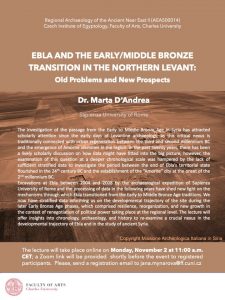
Lecture by Marta D’Andrea – Sapienza University of Rome
The investigation of the passage from the Early to Middle Bronze Age in Syria has attracted scholarly attention since the early days of Levantine archaeology, as this critical nexus is traditionally connected with urban regeneration between the third and second millennium BC and the emergence of Amorite identities in the region. In the past twenty years, there has been a lively scholarly discussion on how Ebla might have fitted into the big picture, however, the examination of this question at a deeper chronological scale was hampered by the lack of sufficient stratified data to investigate the period between the end of Ebla’s territorial state flourished in the 24th century BC and the establishment of the “Amorite” city at the onset of
the 2nd millennium BC.
Excavations at Ebla between 2004 and 2008 by the archaeological expedition of Sapienza University of Rome and the processing of data in the following years have shed new light on the mechanisms through which Ebla transitioned from the Early to Middle Bronze Age traditions. We now have stratified data informing us on the developmental trajectory of the site during the later Early Bronze Age phases, which comprised resilience, reorganization, and new growth in the context of renegotiation of political power taking place at the regional level. The lecture will offer insights into chronology, archaeology, and history to re-examine a crucial nexus in the developmental trajectory of Ebla and in the study of ancient Syria.
Podrobnosti události
- Začátek události
- 2.11.2020 11:00 - 12:00
- Místo konání
- Zoom
- Organizátor
- Český egyptologický ústav FF UK
- Typ události
- Přednášky